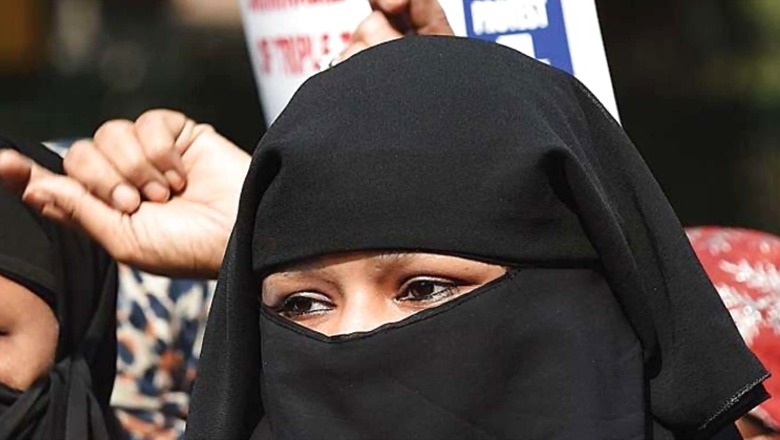
views
The Muslim Women (Protection of Rights on Marriage) Act or the Triple Talaq Law invoked sharp reactions during its passage in 2019. There is continued criticism of the law till date on various grounds including political and legal. The key question is whether or not this law has helped the Muslim woman against the injustice of instant and unilateral triple talaq. An objective assessment indicates that there are mixed results and it is still too early for a sound legal protection mechanism to have kicked in.
The issue of gender justice in the family for Muslim women has been forever mired in a complex web of conservatism, patriarchy and politics. Religious leaders routinely say that Islam gave rights to women 1400 years ago but refuse to answer whether these rights have translated into reality or not! Reform in Muslim family law has remained elusive for seven decades post-Independence. Despite Quranic injunctions on justice and fairness, this has been a hugely politicized issue.
India needs a comprehensive Muslim family law which protects legal rights of women just as the Hindu marriage, succession and other laws protect rights of Hindu women. This law should have been passed in the 1950s and 1960s when various laws under the Hindu Code Bill were being passed by Parliament. The following decades saw amendments to Hindu Code laws as well as enabled divorce rights for Christian women. However, the legal discrimination of Muslim women and thereby the whole community continued owing to the opposition by conservative clergy to a codified family law.
Indian Muslims are governed by Shariat Application Act, 1937, which does not provide safeguards regarding age of marriage, divorce, polygamy, custody and guardianship of children to mother, women’s share in property etc. Consequently, practices such as child marriage, triple talaq, halala, polygamy, denial of share in property to women have continued against Quranic principles of gender justice and constitutional principles.
ALSO READ | Two Years of Triple Talaq Law: All About the Legislation That Banned Instant Divorce by Muslim Men
The nation remembers Shah Bano, a 65-year-old divorced woman who was denied a nominal monthly maintenance of Rs 180 granted by the court. The government, clergy, politicians connived to deny justice to a helpless woman under the bogey of upholding sharia and thereby religion. Besides, the Shah Bano episode gave a bad name to secularism that persists even today!
In the last 10 to 15 years, Indian Muslim women have become vocal about their rights in family and have spoken out against triple talaq and other misogynist practices. They have become aware about justice and equality and begun questioning conservative clergy. The Supreme Court judgment of 2017 banning triple talaq became possible thanks to tireless efforts of ordinary women. The petitioners Shayara Bano, Afreen Rehman, Ishrat Jahan and others received massive popular support from women and men of all faiths across India. The Centre filed an affidavit supporting the abolition of the practice.
The women-led campaign against triple talaq generated huge awareness and understanding within the community about the practice not being sanctioned by the Quran. Conservative religious male bodies such as the Personal Law Board lost credibility in the process. The awareness, the Supreme Court verdict and the law have led to the incidence of triple talaq drastically going down.
However, women face hurdles in registering FIRs in many places. One of the key objections to the Triple Talaq Law was that it criminalizes the offence. One MP from Hyderabad said in Parliament that the law seems to have been designed to “send Muslim men to jail”. But the ground reality suggests that although the incidence has gone down overall, the legal fight remains a challenge for most women. Greater sensitization of police, personnel in family courts, lower judiciary can help women obtain justice.
It must be remembered that triple talaq was taking place despite the SC judgment banning it. Under the circumstances, what is an aggrieved woman supposed to do? She can do little else apart from quoting the judgment to the husband determined to pronounce talaq and throw her out of the home. The law comes handy in such a situation although it does not lay down the procedure of divorce. Nor does it provide the right to reside in marital home to the woman. However, it enables reconciliation between the couple as the offence is bailable and compoundable.
Indian women bear the brunt of a patriarchal society and policies based on electoral politics. Women suffer at home, in family, at workplace despite the Constitutional promise of justice, equality, non-discrimination. Muslim women additionally suffer legal discrimination owing to lack of legal protection in family matters. Though not perfect, the law against triple talaq is a welcome step forward. Legal reform is an important part of a much-deeper process of social reform, especially in a poor, educationally and economically deprived community. The law will have to be followed by awareness, education and empowerment of both women and men.
The author is co-founder of Bharatiya Muslim Mahila Andolan. The views expressed in this article are those of the author and do not represent the stand of this publication.
Read all the Latest News , Breaking News and IPL 2022 Live Updates here.




















Comments
0 comment